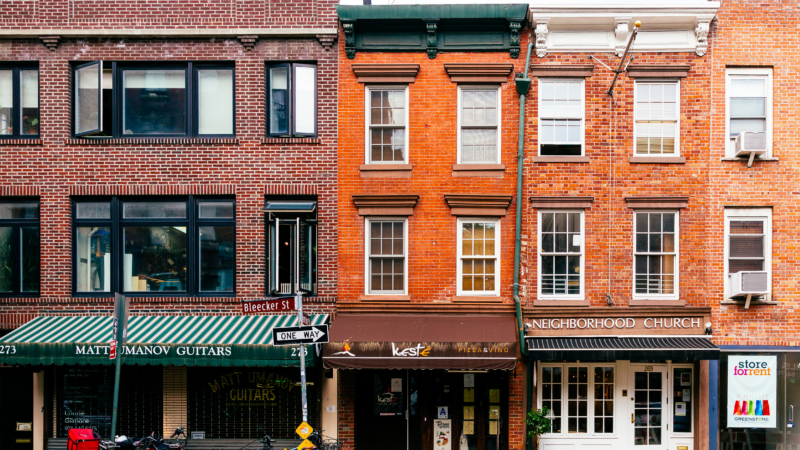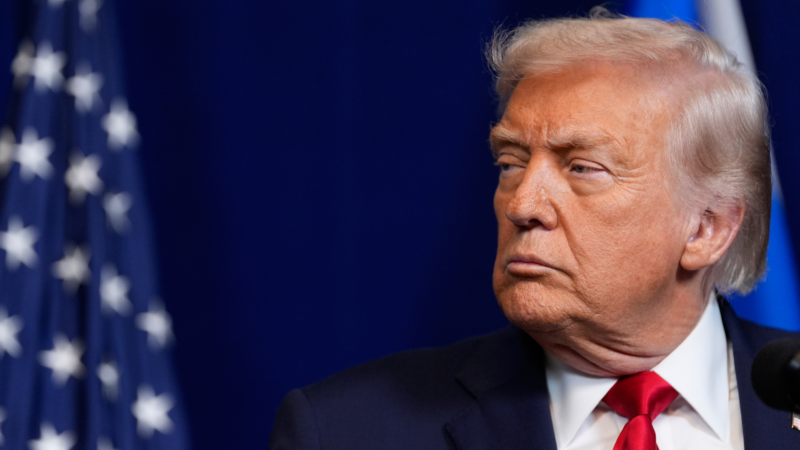Between tariffs and survival, American business owners are doing alarming math
Many American shop owners are feeling like collateral damage in the global trade war.
Sarah Wells ponders how her 13-year-old business, selling breast-pump backpacks and other items for new moms, will run under President Trump’s new tariffs on all imports.
Just this year alone, her company Sarah Wells Bags has shouldered the cost of two rounds of tariffs, which took effect right as Wells’ shipment from China was en route.
Her large order was loading at the port in February, when the White House raised tariffs on Chinese imports by 10%. By the time it docked stateside in March, tariffs had gone up again, by another 10%. Wells had to shell out an unexpected $15,000 to release her goods from customs.
Now, with the latest round sending total tariffs on Chinese imports to 54% — eating her profit margin — Wells is reeling. She may have to raise prices, but how much before shoppers rebel and stop buying? She plans to retrench: order less, pause hiring, stop developing new products.
“Even if we pass some (cost) to the consumer, we can’t pass it all,” says Wells, based in Virginia. “So I really think the honest answer is that businesses will close.”

For some, it’s survival mode, which means shrinking selections and freezing hiring
How much or how quickly shoppers might pull back is not clear. The National Retail Federation had forecast retail sales to grow this year — slower than in recent years, though more like they did before the pandemic: between 2.7% and 3.7%.
But the forecast was released before the magnitude of new tariffs became clear — spanning the globe, ranging from 10% to over 50% — and now the trade group says it’s “impossible to predict … the magnitude of change on prices and on consumer spending.”
Giants like Walmart, for example, are now pressuring their foreign suppliers for discounts to offset some of the tariffs. Smaller retailers don’t have that kind of muscle. In surveys, retailers across the board warn they’ll have to raise prices.
And then there’s the scale-back. Like Wells, many business owners are thinking of pulling back: perhaps shrink the store’s selection so there’s less to ship, freeze hiring, pause advertising or developing new products — stop growing and go into survival mode.
“What is the need-to-have versus the nice-to-have … I think right off the bat, that’s where it will start,” says Jessica Bettencourt, who runs Klem’s general store in Massachusetts. Founded by her grandfather 75 years ago, Klem’s sells a wide range of products including hardware, pet food and clothes.
U.S.-made can mean 3 to 4 times the cost
One key argument President Trump makes in favor of tariffs is that they would jump-start American manufacturing, forcing more companies to source their products domestically.
Wells, Bettencourt and many others will say: They’ve tried.
U.S. manufacturers couldn’t tackle the scale of Wells’ orders, she says, when she looked into making or at least assembling her backpacks and purses here. Plus, those manufacturers told her, the raw material would have to come from China anyway.
South Carolina business owner Rozalynn Goodwin ran into a similar challenge.
“We have, for the last eight years, been trying to manufacture in the United States,” says Goodwin. She and her daughter sell double-snap hair barrettes called GaBBY Bows.
“Every manufacturer in the United States we’ve spoken to has told us, ‘You need to continue making this in China. It’s going to cost you three to four times more to make it here,'” Goodwin says. “Our customers will not pay $8 or $10 more for this product.”
The case of $400 work boots
For many common items — clothes, shoes, toys, electronics — the U.S. has not manufactured them at scale in ages, if ever. Smaller-scale operations are much costlier, often double or triple the price of overseas options, and typically require imported supplies anyway, as Wells had discovered.
Bettencourt says, consider work boots. Her store does carry American-made boots, and they’re $400 a pair. Imported alternatives sell for half that amount.
“Not everyone can buy a $400 pair of work boots,” she says. “So I do want to always look at that U.S.-made product first, but I also have to offer my customers what they can afford.”
As another shopkeeper put it: Small-business owners like to make their own decisions and feel like they can live and die by them; the sweeping blanket tariffs are taking that ability out of their control.
Transcript:
MICHEL MARTIN, HOST:
From Wall Street to Main Street, businesses are reeling from President Trump’s expanded trade war.
LEILA FADEL, HOST:
Steep new tariffs are set to take effect at midnight on nearly everything the U.S. imports. U.S. stock markets opened sharply lower this morning, heading for a second day of steep declines. The Dow fell about 1,000 points shortly after it’s opening. Big businesses are losing market share, and small businesses feel like they’re caught in the middle of something they can’t control. Even higher taxes are due to kick in next week.
MARTIN: We’re going to talk this through with two of NPR’s business correspondents, Scott Horsley and Alina Selyukh. Welcome to you both.
ALINA SELYUKH, BYLINE: Hello, hello.
SCOTT HORSLEY, BYLINE: Good morning.
MARTIN: So, Scott, I’m going to start with you. Judging by the stock market’s reaction, a lot of investors have been really rattled by these tariffs. But, you know, Trump had been talking about this for weeks, so why are they so spooked?
HORSLEY: Yeah, this was a seismic shakeup. The Dow Jones Industrial Average tumbled more than 1,600 points yesterday, or nearly 4%. The Nasdaq dropped nearly 6%. It was the biggest one-day sell-off in the stock market since early in the pandemic. President Trump has ordered a minimum 10% tax on nearly everything the U.S. buys from other countries. He’s also ordered much higher levies on things we buy from China, Japan, the European Union. Altogether, we are looking at about a ninefold increase in tariffs now compared to what we were paying last year, and businesses are worried that it’s going to cause higher prices for them. You know, for weeks, investors have been waving the caution flag, signalling they don’t want a wider trade war. But Commerce Secretary Howard Lutnick told CNN the president’s not about to change course.
(SOUNDBITE OF ARCHIVED RECORDING)
HOWARD LUTNICK: I don’t think there’s any chance that President Trump’s going to back off his tariffs. This is the reordering of global trade.
HORSLEY: If these tariffs stick, it’s going to upend the global trading system that the U.S. has spent decades building and leave this country more isolated from the rest of the world.
MARTIN: Scott, how will these tariffs affect the economy more broadly?
HORSLEY: These tariffs are going to bring higher prices and slower economic growth. Now, we did get some encouraging news on the job market today. The labor department says employers added 228,000 jobs last month, but that’s based on a survey that was done three weeks ago, before this week’s tariff news. Remember, President Trump took over an economy that was in solid shape. Unemployment was low. GDP was growing at a respectable clip. Inflation was a little high, but it had improved significantly from a few years ago. And the president made the decision to flip over the furniture and kick up a lot of dust, so where that dust settles is going to be on him. It’s the old Pottery Barn rule – if you break it, you own the results.
MARTIN: And the president says he’s also counting on these tariffs to raise a lot of money for the government. Will they?
HORSLEY: These are high tariffs, and they could bring in a lot of money. That’s one way the administration plans to make up for the money that the government stands to lose if it extends the 2017 tax cuts. But this is not a simple matter of taking money out of one pocket and putting it in the other. Tariffs will be paid disproportionately from the pockets of working people. That’s who’s shopping at Walmart and paying higher prices for imported toys and shoes and winter produce. Meanwhile, the savings from the tax cuts will primarily flow to the pockets of the wealthy. So this is a reverse Robin Hood policy, trading taxes for tariffs. It takes money from the poor and gives it to the rich.
MARTIN: And how are other countries responding?
HORSLEY: Overnight, China slapped a 34% tariff on all U.S. imports. Other countries will also likely retaliate. That’s going to hurt farmers and factories here in the U.S. What’s more, a lot of countries that depend on exports to the U.S. will find it harder to sell their goods here, and they may be pushed towards recession. You know, Trump has ordered tariffs that are not only higher but also broader than those we’ve seen before. He’s planning to tax all kinds of goods that we do not and cannot produce at commerical scale in this country, like tropical fruit, for example. Even with global warming, I don’t think we’re going to start growing a lot of bananas in the United States. Instead, we’ll keep importing the bananas, but American consumers will have to pay more for them, and nervous shoppers have already started to dial back their spending.
MARTIN: So we’re going to turn to Alina Selyukh now. Alina, you’ve been talking to small retailers, shopkeepers and suppliers from around the country. What have you heard so far?
SELYUKH: You know, they feel like collateral damage. The evening when the tariffs were announced, I was actually at a big reception organized by the National Retail Federation. They had scheduled a fly-in for small business owners. And when the magnitude of tariffs became clear, it was, like, shell shock because it’s these companies that are on the hook to pay many of these fees. For example, Sarah Wells from Virginia shared her story. She sells purses and clothes for new moms. They’re, like, for breast pumps and breastfeeding. They’re made in China, and late last year, she made a huge shipment order. It was loading at the port when the White House raised tariffs on China by 10% in February. By the time it docked stateside, that tariff was raised again – another 10%.
SARAH WELLS: And I had to come up with $15,000 of extra cash to release my goods just this last month.
SELYUKH: And now that the total tariff on Chinese imports is up to 54%, you know, Wells is reeling.
MARTIN: What do people like her plan to do?
SELYUKH: You know, one common answer is retrenching and scaling back. Maybe your store shrinks the selection so there’s less stuff to ship. Maybe you stop hiring, stop advertising or developing new products – essentially, stop growing and go into survival mode. One retailer talked about saving a lot of money in his bank account. It’s money that he could be spending on all kinds of things – to expand, hire, market – but now he wants that money to just kind of sit on the sidelines because he expects to pay big tariffs. And then the other answer is what Scott talked about. It’s raising prices. Giant companies like Walmart are pressuring suppliers overseas to bear some of those tariff costs. Well, small retailers – they don’t have that kind of muscle. And if they pass the cost to consumers with higher prices, you know, how high can they really go before they start losing sales? Sarah Wells had a grim take.
WELLS: Even if we pass some to the consumer, we can’t pass it all. So I really think the honest answer is that businesses will close.
SELYUKH: And that’s the worst-case scenario that she thinks a lot of business owners will have to confront and will have to see.
MARTIN: You know, Alina, one of President Trump’s arguments for these tariffs is that they would bring manufacturing back to the U.S. What about these businesses? Can they find suppliers here?
SELYUKH: There was a lot of discussion about this at the event that I attended. There was actually this moment when a moderator asked a panel of small business owners, including Wells, to raise their hands if they tried to find domestic manufacturers first, and all the hands went up. But the reality is, for so many things – you know, clothes, shoes, toys, electronics – the U.S. has not manufactured them at scale in ages, or ever. And so, you know, one shopkeeper says she sells work boots. She has American-made boots. They are $400. Not everyone can afford that, so she also has imported ones that are half the price. Or I also talked to Danny Reynolds. He runs Stephenson’s clothing boutique in Indiana. It sells also wedding gowns. And he says he supports the president’s mission to level the trade playing field. He would love to have more U.S.-made gowns. They are great quality, but they’re three times as expensive. And all the big bridal gown makers – they’re overseas.
DANNY REYNOLDS: There are only so many wedding gown manufacturers in this world, especially playing in our price-range space. And as a smaller retailer, our hands are kind of tied in this regard.
SELYUKH: He says businesspeople love to negotiate their deals, make their own decisions and, you know, live and die by them. And the sweeping tariffs take that ability out of their control.
MARTIN: That is NPR business correspondents Alina Selyukh and Scott Horsley. Alina, thank you.
SELYUKH: Thank you.
MARTIN: Scott, thank you.
HORSLEY: Good to be with you.
Warren Buffett officially retires as Berkshire Hathway’s CEO
The legendary 95-year-old investor spent decades building his company into one of the world's largest and most powerful. Now Greg Abel is taking it over.
Crypto soared in 2025 — and then crashed. Now what?
For most of 2025, cryptocurrencies such as bitcoin surged as President Trump vowed to make the U.S. a crypto leader. But now, a severe sell-off has shaken the sector.
Zohran Mamdani sworn in as New York City mayor, capping historic rise
Mayor Zohran Mamdani took the oath of office in New York City after midnight Thursday. The city's first Muslim mayor, a member of the Democratic Socialists of America, has promised to focus on affordability and fairness.
Rising from the ashes, a symbol of hope at the Rose Parade
Survivors of the Eaton and Palisades Fires find healing and community working on a Rose Parade float to honor the lives and communities lost in last year's wildfires.
The history behind the NYC subway station chosen for Mamdani’s swearing-in
The city shut down the station in 1945 on New Year's Eve. Eighty years later, it's a symbolic venue choice for the incoming mayor's private swearing-in ceremony.
U.S. military strikes 5 more alleged drug boats, killing 8
The U.S. military says it struck five alleged drug-smuggling boats over two days. The attacks killed eight people, while others jumped overboard and may have survived. U.S. Southern Command did not reveal where the attacks occurred.







